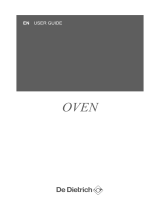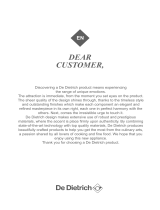
7
General Settings and Use
Oven functions
Each of the oven functions uses different elements within the oven to offer you the best choice of cooking every time.
These are explained below.
1. Defrost – preset 35˚ (range available 35-75˚) Recommended shelf level 1
Using the fan and a limited amount of heat, this oven function circulates the air around the oven cavity,
speeding up the natural defrost process.
Meats should be placed on a dish to catch liquids from the defrosting process. These liquids are not
edible.
2. Conventional Oven – preset 200˚ (range available 75-250˚) Recommended shelf level 1 or 2
This function uses the top and bottom heating elements only.
Natural convection creates a perfect cooking zone in the centre of the oven, ideal for dark fruit cakes
and pastries.
Preheating is recommended with the conventional oven function.
3. Fan With Lower Heat – preset 150˚ (range available 75-250˚) Recommended shelf level 1, 2 or 3
This function circulates the heat produced by the bottom element, with a small amount of heat from
the grill and the fan.
The shelf should be on the lowest shelf support setting.
This function is recommended for quiches, fruit tarts etc to cook the crust thoroughly. This function is
also recommended for dishes that rise (e.g. cakes and soufflés) where a crust on the top is not required.
4. Half Grill – preset 230˚ (range available 100-275˚) Recommended shelf level 2 or 3
This function radiates the heat from the grill element.
The fully temperature variable grill in the half grill function is ideal for small amounts of food.
5. Full Grill – preset 210˚ (range available 100-275˚) Recommended shelf level 2 or 3
This function radiates the heat from the grill element.
The fully temperature variable grill in the full grill function is ideal for full family meals or large meals.
6. Fanned Grill – preset 190˚ (range available 100-250˚) Recommended shelf level 1,2 or 3
This function uses the fan to circulate the heat from the grill element around the food.
Foods cook quickly on both sides without the need for turning or preheating the oven.
This function is recommended for all roast meats, and to retain the moist texture of fish steaks.
7. Fan Oven – preset 190˚ (range available 75-250˚) Recommended shelf level 1,2 or 3
Using the fan element and the fan, this cooking function blows the hot air into and around the oven
cavity.
Temperatures are achieved quicker, reducing or even removing the need for preheating.
Both cooking temperatures and cooking times can be reduced for a more energy efficient cooking
programme.
Perfect for cooking white meat, fish and vegetables moist.





















